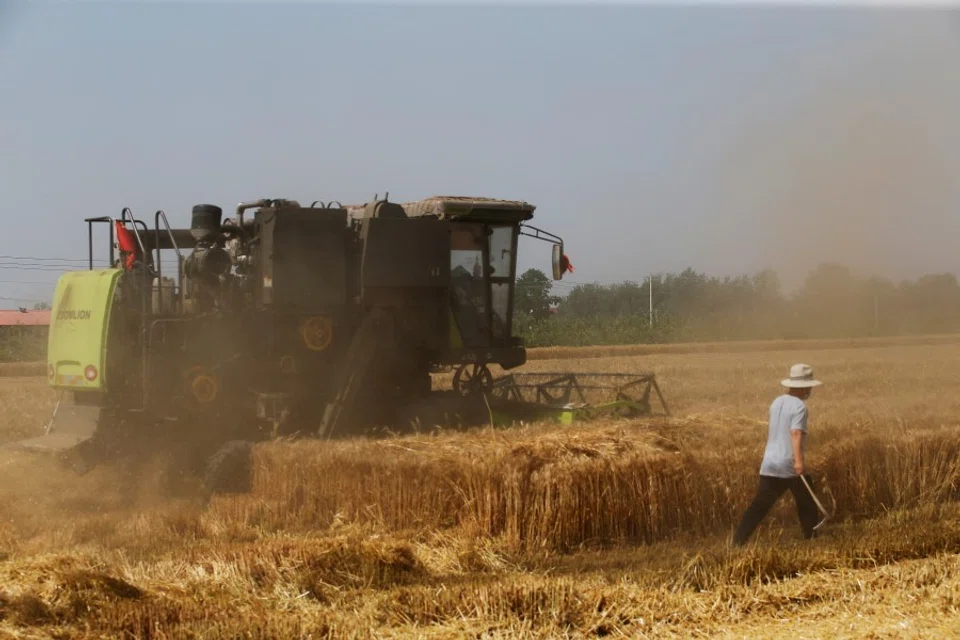Chinese farmers struggling with excessive anti-epidemic measures
With China seeing virus outbreaks in various areas, local governments have been ramping up anti-epidemic measures. The farming sector has been hit hard, especially considering the spring planting season that needs all hands on deck. But despite recent notices from the authorities calling for smooth movement of agricultural supplies and labour, the implementation on the ground may not be easy.

Since the beginning of the year, there have been multiple outbreaks and resurgences of Covid-19 across China, leading to the ramp up of anti-epidemic control measures in various places. China's economy and society have been impacted to varying degrees in different regions, as many places have continually added more layers of control to the existing control measures.
The temporary impact on the industrial and service sectors can be mitigated with extra effort, but it is not the same situation for agricultural production, which must closely follow the seasonal timing.
Once the appropriate timing is past, the year's production will be affected with no way to make up for the lost time, hence the belief that "one moment's delay by man on the land means one year's delay by the land for man" (人误地一时,地误人一年).
And so, for thousands of years, the Chinese saying goes, "Farm work must be done in the right season (不违农时, lit. do not go against the time for farming)." And in fact, this does not only apply to China, but to the whole world as well.
Food security for China and the world
China is the most populous country in the world, and there is no doubt that ensuring food security is of utmost importance for China and the whole world. Hence, the implementation of food security policies have been prioritised by the Chinese government for years.
While China has seen abundant grain harvests for many years, with the consumption levels among the Chinese increasing annually, consumption of animal products such as meat, eggs and milk has also gone up significantly, prompting a strong increase in demand for animal feed such as soybeans and corn.
In recent years, China's soybean imports have hovered around a high of 100 million tonnes, accounting for 60% of global trade in corn, with a jump in corn imports last year. As grain supply and demand in China is a tight balancing act, the Chinese government has repeatedly called on various regions to spare no effort in stepping up grain production.

As the Chinese saying goes: "Plans for the year begin in spring (一年之计在于春)." Clearly, it is crucial for the spring planting to be properly carried out to ensure that grain production achieves expected yields. But the pandemic has affected the spring planting work in China's farming villages to varying degrees, casting great uncertainty over a good harvest this year.
Although the local governments have worked hard to resolve the negative impact of the pandemic on spring planting production, these effects are clearly difficult to completely eliminate.
... farmers should be sent to the fields for spring planting as soon as possible, with differentiated anti-epidemic control measures and personal protective measures in place.
So, China's Ministry of Agriculture and Rural Affairs recently released an urgent notice, calling for the proper handling of both anti-epidemic controls and spring planting production efforts. It states the need to avoid delays to the preparations for spring planting and to lay a firm foundation for abundant grain harvests for the whole year.
The notice also calls for various regions to take responsibility and stabilise the area and scale of spring planting, and implement shared responsibility of government leaders towards food security. Furthermore, there should be strict checks on these responsibilities, and the tasks should be assigned to cities and provinces before the spring planting begins.
In addition, the notice states that farmers should be sent to the fields for spring planting as soon as possible, with differentiated anti-epidemic control measures and personal protective measures in place. The farmers and modern agricultural entities should also be guided on best practices in the farming fields to prevent workers from congregating and to ensure ample sowing while not leaving fields to fallow.
Farm workers stuck in cities
While Northeast China has always been the major grain-producing region, the farm workers will travel to the cities during the winter break to work and earn extra income, and later return to the villages in time to prepare for the start of spring planting.
Early April is the key period to prepare for spring planting in the northeast region. To ensure that the spring planting goes smoothly, agricultural activities such as cultivating rice seedlings, clearing the fields of straw or chaff, and tilling have to be done in strict order. A delay in one step will affect sowing and the whole year's harvest.
As of 10 April, one-third of farm workers are still stuck in the cities, while about half of the rice has been planted...

But this year, there are stronger anti-epidemic control measures, especially given the high number of infections in Jilin province, leading to strict entry and exit controls - farm workers who went to work in the cities cannot return to the villages to prepare for the planting.
As of 10 April, one-third of farm workers are still stuck in the cities, while about half of the rice has been planted, which is undoubtedly having a huge impact on Jilin's spring planting production.
So, the Jilin government released a work plan to bring farmers stuck in the cities of Changchun and Jilin back to the villages for the spring planting (《关于滞留长春、吉林两市农民返乡春耕工作方案》), requesting relevant parties to implement a green lane for farm workers to return to the villages and clear the choke points; ramp up health screenings for those returning; implement closed-loop management; set up a green lane and ramp up logistics services for the unhindered movement of agricultural supplies; and avoid setting up severe transport blockades that would delay farming activities.
Priority given to agricultural supplies
Liaoning, which has likewise been affected by the pandemic, is also ramping up on clearing choke points. The transportation department and other agencies in Liaoning issued a notice to ensure the smooth movement of agricultural supplies in the province for spring planting.
Provided the proper anti-epidemic controls are carried out, the agencies called for various areas to avoid implementing blockades unless they are necessary; and to ensure the smooth passage for vehicles transporting agricultural supplies such as fertiliser, seeds, agricultural chemicals and machinery, animal feed, medicine and anti-viral supplies, as well as cross-regional agricultural machinery and vehicles transporting farmers returning to villages and dedicated sowers entering the villages.
Liaoning has said that there will not be "one size fits all" additional measures, and villages or roads should not be cordoned off without approval; companies at the ports have to coordinate port operations to improve the logistics for fertilisers and ensure that they are cleared from the port as soon as possible; and the rail transport department has to give priority to the transportation of fertiliser.
... the farmers are only allowed to commute between their residence and the farming field, and are not allowed to leave the two designated areas unless necessary.
As for Shenyang city, from 8 April, the farming areas within Yuhong and Liaozhong districts have become controlled areas with the implementation of measures such as restricted point-to-point movement (两点一线), whereby the farmers are only allowed to commute between their residence and the farming field, and are not allowed to leave the two designated areas unless necessary.

Depending on the situation on the ground, these farm areas will organise staggered timings for field work and operations, and arrange for dedicated personnel in villages to take care of farmers who cannot work due to the pandemic.
The personnel will ensure the ample supply of farm materials, and that the farming land does not lie fallow by arranging for timely sowing through rotation, as well as substitute and assistant farmhands.
In addition, provided the proper anti-epidemic controls are in place, there should be an orderly opening up of production, storage, transport and sales of agricultural supplies for spring planting.
... some farmers have been arrested for working in the field, while "enforcement personnel" have emerged to stop "malicious spring planting and malicious sowing".
But even if these measures are fully implemented, most farmers will find the staggered timings for field work a hassle. The land is a lifeline for the farmers, who for the longest time have always gone to the field at any time, put in the hard work, check on seedlings and adjust their farming methods accordingly. But now they do not have the same freedom, and the impact of the pandemic on the spring planting is clear.
In some places, some farmers have been arrested for working in the field, while "enforcement personnel" have emerged to stop "malicious spring planting and malicious sowing". This is clearly veering towards extremism, and unfortunately, they are not isolated cases.
Despite the central and local governments repeatedly stressing the need to consider both the pandemic and spring planting, there are many examples of enforcement personnel going to the extreme, leading to complaints by many farmers.
In fact, the spring planting of 2020 was more severely affected by the pandemic, because many places in China were under prolonged lockdowns. After two years of fighting the pandemic, China has gained rich experience and mapped out an effective method that balances fighting the pandemic with growing the economy, so the spring planting should not be affected by the pandemic to begin with.
But in line with the upcoming Chinese Communist Party's 20th Party Congress in the second half of this year, coupled with the situation in Shanghai that is spinning out of control since March - despite being known for its "precise outbreak containment measures" - various areas have continued to ramp up their anti-epidemic measures.
And so, it is inevitable that the spring planting has been affected. It remains to be seen how this will affect China's grain production this year - the outlook seems grim.





![[Photos] Fact versus fiction: The portrayal of WWII anti-Japanese martyrs in Taiwan](https://cassette.sphdigital.com.sg/image/thinkchina/3494f8bd481870f7c65b881fd21a3fd733f573f23232376e39c532a2c7593cbc)